Key takeaways:
- Power outages can create vulnerability and disrupt daily routines, highlighting the need for preparedness.
- Having a power outage plan, including communication strategies and assigned roles for family members, can reduce panic and improve safety.
- Maintaining essential supplies, like non-perishable food and backup communication tools, is crucial for managing outages effectively.
- Personal experiences during outages can foster connection and reflection on the importance of being prepared and appreciating quiet moments.
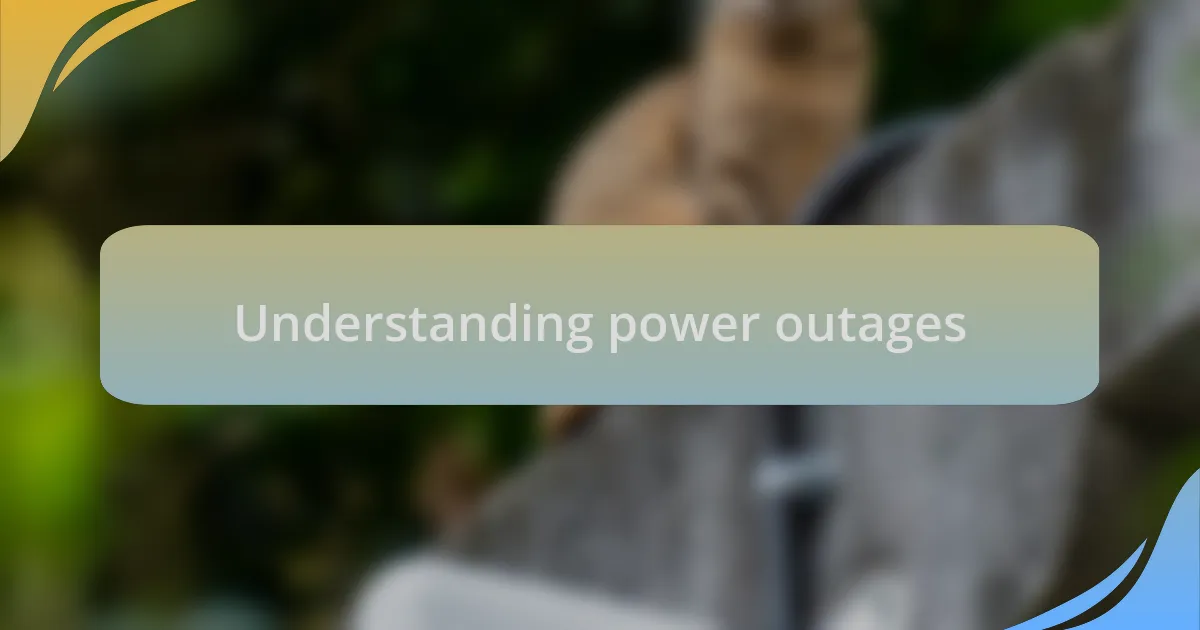
Understanding power outages
Power outages can happen for various reasons, often when we least expect them. I remember one stormy night when the lights flickered out, plunging my house into darkness. It made me realize how reliant we are on electricity for even the simplest tasks, like making a cup of tea or charging my phone.
It’s interesting to consider how we often take our power supply for granted. Have you ever thought about the intricate network of systems that deliver electricity to our homes? From the power plants to the transmission lines, each step is crucial, and a problem anywhere along that path can leave us in the dark, both literally and figuratively.
Emotionally, power outages can create a stark sense of vulnerability. I felt that pang of anxiety when I lost power during a particularly intense thunderstorm. The quietness of an unlit room can be unsettling, reminding us of how quickly our comfort and normalcy can be disrupted. In those moments, it’s vital to remember that preparedness is key, and understanding the nature of power outages can help us respond more effectively.
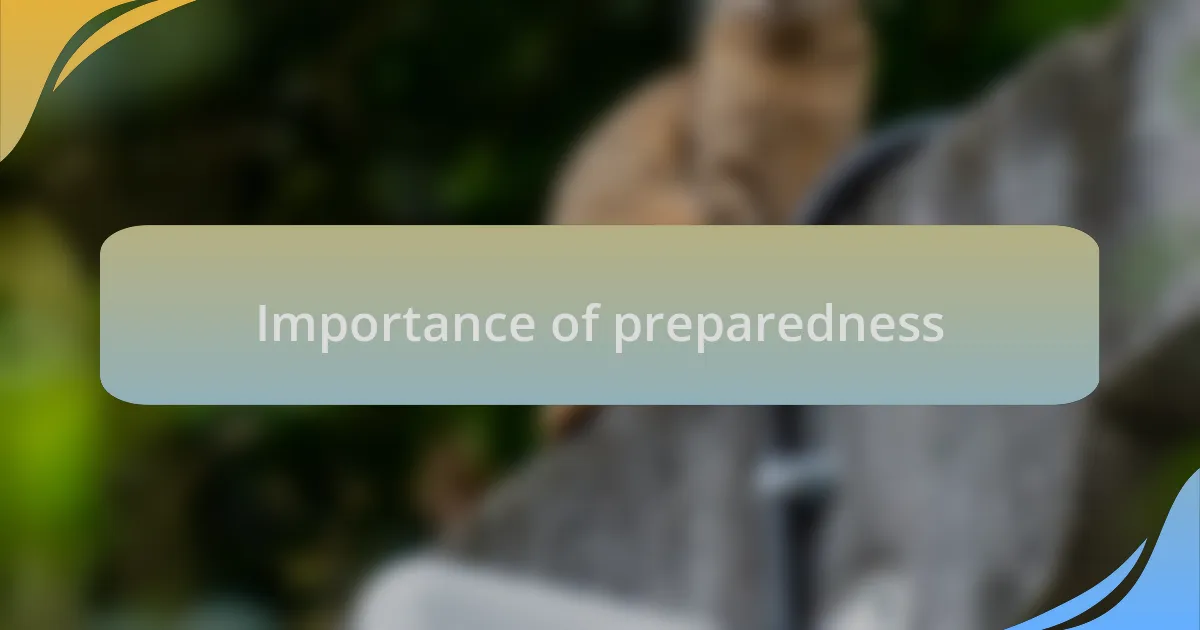
Importance of preparedness
It’s fascinating how an unexpected power outage can abruptly shift our daily routine. I recall a time when a storm knocked out electricity for several hours, and I found myself rummaging through my drawers for candles and flashlights. That experience underscored the importance of being ready; having a small stash of supplies can really ease the panic when darkness descends.
Preparedness isn’t just about having flashlights and batteries; it’s also about mindset. I remember talking to a friend who had a plan in place for emergencies, and she exuded a sense of calm that I envied. Isn’t it reassuring to have strategies to fall back on? Knowing what to do in a power outage, like securing food and water, can transform a stressful situation into a manageable one.
Additionally, I’ve learned that sharing preparedness tips with neighbors can foster a sense of community. After my last blackout, we gathered to discuss emergency plans, and it felt good to unite over a common concern. When you’re part of a network that understands the importance of preparedness, it creates a support system that can make all the difference when the lights go out.
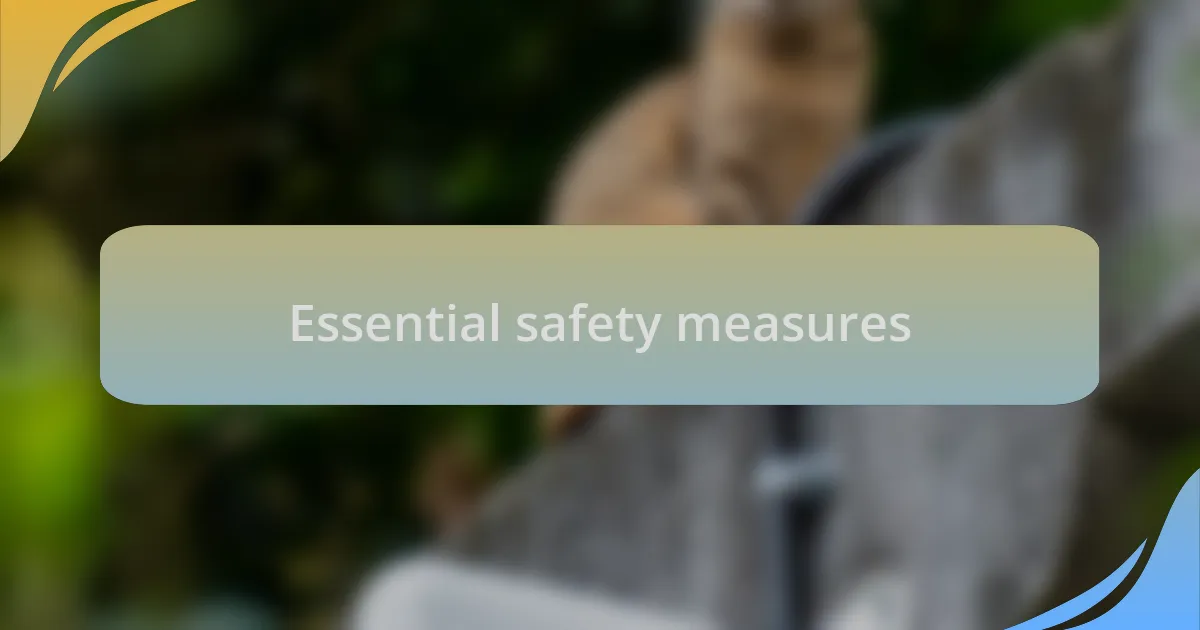
Essential safety measures
When a power outage strikes, the first safety measure I prioritize is ensuring my home is secure. I make it a habit to check my doors and windows, ensuring they’re locked and bolted, especially if it’s nighttime. It’s a simple step, but don’t you feel more at ease knowing that you’ve taken precautions to protect your space?
Another crucial measure involves managing essential supplies. I’ve learned the hard way the importance of keeping a stocked pantry. During one particularly long outage, I discovered that having canned goods and bottled water made a significant difference. It’s easy to overlook these items until you find yourself relying on them. Do you have enough provisions to last a few days? A little planning can go a long way.
Lastly, I can’t stress enough the importance of battery-powered or solar-powered tools. During that storm I mentioned, my portable charger became my lifeline for communication. Having these amenities makes a daunting situation feel more controlled and connected. Have you considered how you would stay in touch with family and neighbors? Having these tools ready can help bridge the gap during emergencies.
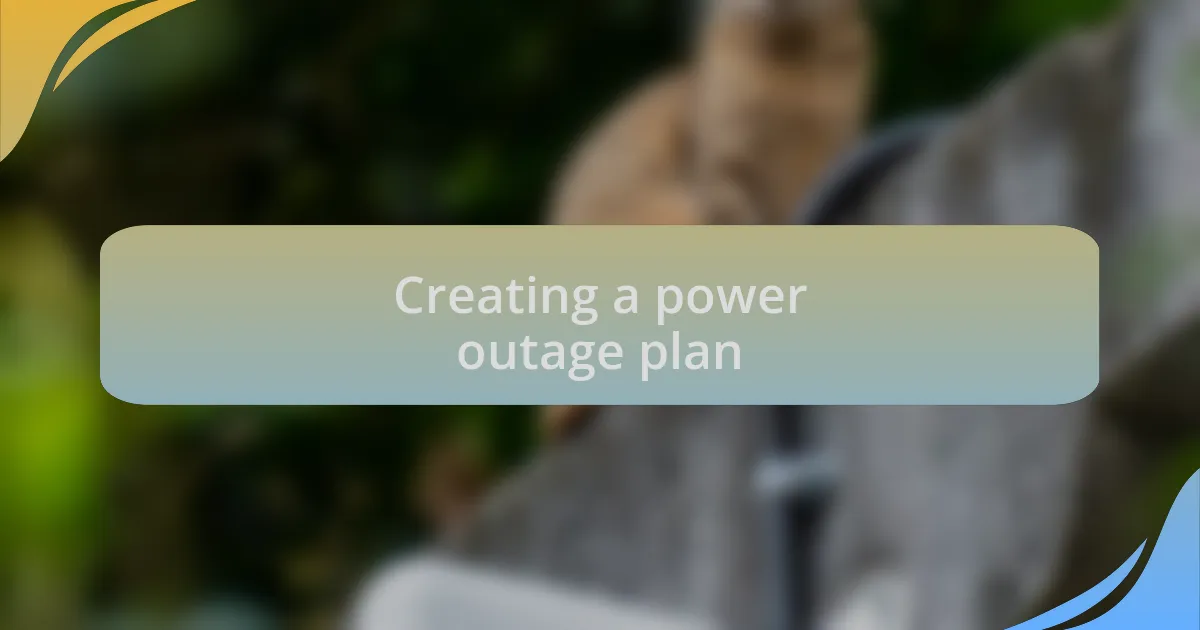
Creating a power outage plan
Creating a power outage plan can seem overwhelming, but breaking it down makes it manageable. I remember sitting down with my family one evening, discussing our strategy in case of an outage. It was a bonding moment that not only eased our worries but also sparked essential conversations about our needs and preferences during challenging times. Have you had a similar discussion with your loved ones?
A fundamental aspect of our plan involves determining how to stay informed. I invested in a battery-operated emergency radio after realizing how disconnected I felt during one outage. It’s amazing how calming it can be to hear the latest updates on weather and power restoration while you’re waiting in uncertainty. What would you do to keep updated when the lights go out?
Finally, I recommend mapping out specific roles for each family member when a power outage occurs. Assigning tasks, like checking flashlights or gathering supplies, can make everyone feel involved and reduce panic. During a recent outage, my child took charge of finding our emergency kit, and it transformed a potentially stressful experience into a team effort. Have you thought about how your family can work together in such moments?
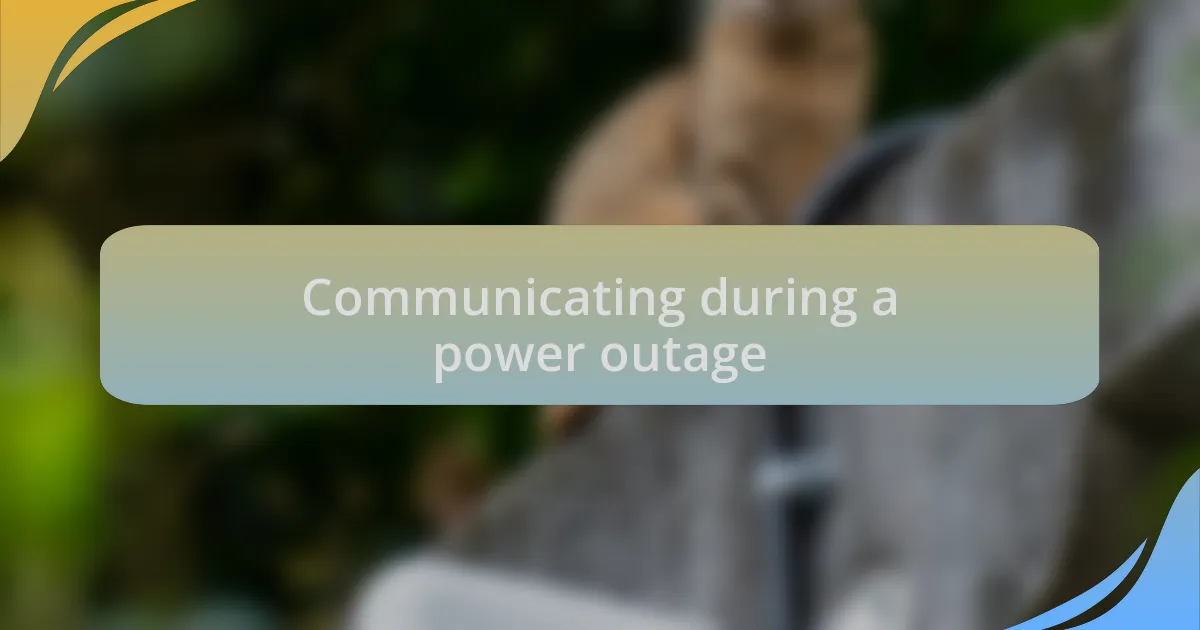
Communicating during a power outage
Communicating during a power outage can be one of the most challenging aspects to navigate. I recall a particularly tense evening when the lights went out unexpectedly. My first instinct was to reach for my phone to send a text to my neighbor about the situation, but then I remembered that without power, our cell service was sketchy at best. Have you ever found yourself in a spot where technology failed you just when you needed it?
I soon turned to a more reliable option: our landline. It may seem outdated, but having a conventional phone allowed me to connect with my family and friends, providing reassurance that we were all okay. It was a reminder that simple, traditional methods of communication often have their place even in our tech-savvy lives. What strategies do you have in place to stay connected when modern technology lets you down?
Additionally, I discovered the importance of establishing a designated meeting point outside for family members who might be away from home during an outage. On one occasion, my son was at a friend’s house, and being able to tell him to return to our usual spot helped ease my worry. It’s amazing how a clear plan can eliminate confusion and provide peace of mind. Have you considered how you can create similar safety nets for your loved ones?
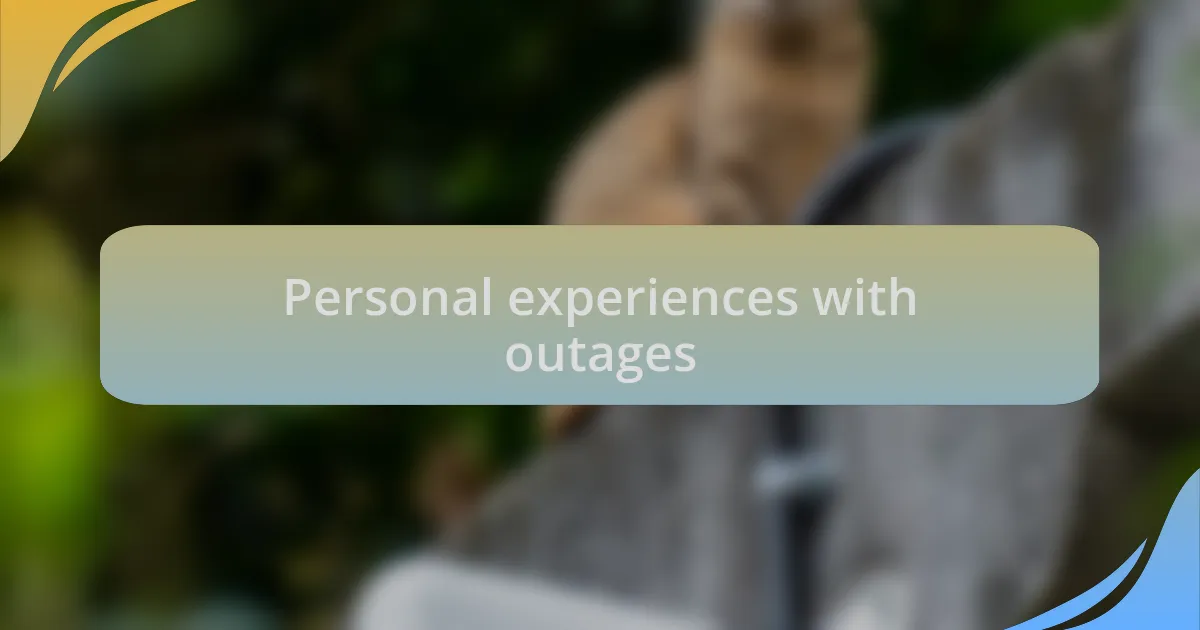
Personal experiences with outages
Experiencing a power outage often opens a floodgate of memories. One time, a summer storm knocked out our electricity for hours. I remember sitting in our dimly lit living room, surrounded by candles, and reminiscing with my family about past outages. It turned into an unexpected gathering where laughter filled the air, offering comfort amidst the uncertainty.
Another time, during an extended blackout, I realized just how reliant I had become on electronic entertainment. With no television or video games, my family and I dusted off some old board games. I was surprised at how much fun we had rediscovering those simple joys. It made me wonder: how quickly can we forget the unique experiences that come from disconnecting?
There’s also that feeling of vulnerability that creeps in during prolonged outages, especially at night. I vividly remember hearing every little creak and groan of the house, which made me question my surroundings. In those moments, I learned the value of being prepared. Reflecting on it now, I often ask myself how I can better equip my home and family for future outages. What steps are you taking to ensure you’re not caught off guard?
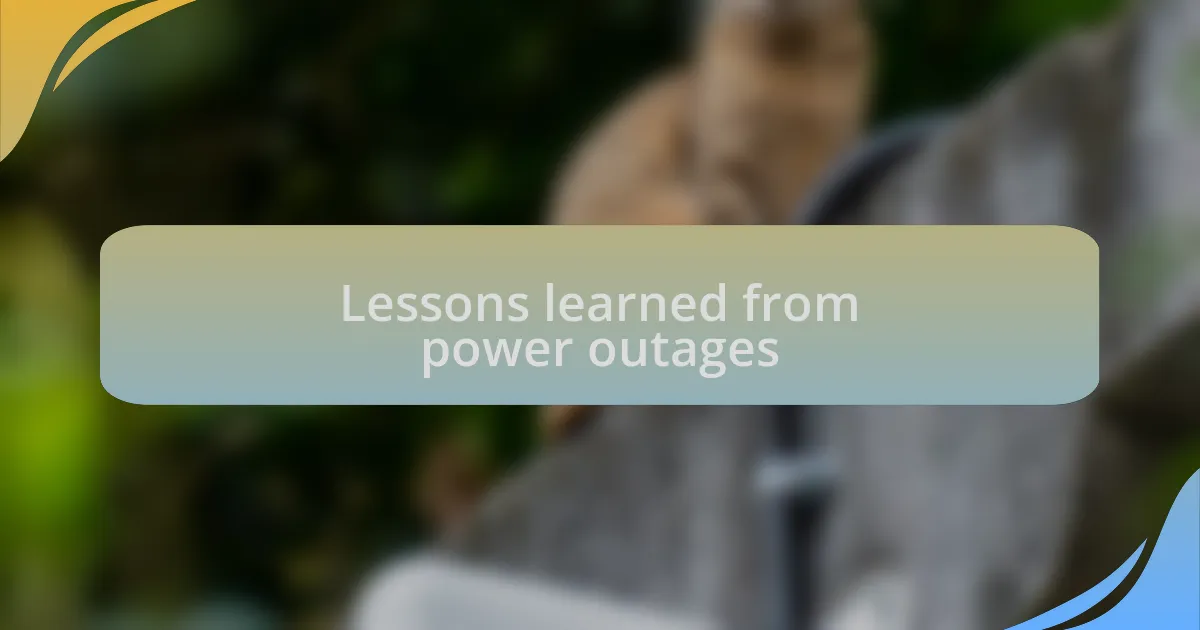
Lessons learned from power outages
When I think back on the outages I’ve experienced, one lesson stands out: preparation is key. During a particularly prolonged blackout one winter, I was reminded that having a well-stocked emergency kit makes all the difference. I found myself rummaging through my supplies, grateful for the flashlight and batteries, while regretting not having more non-perishable snacks on hand. Are you ready for those unexpected moments?
Another eye-opener for me was the importance of communication. After a power outage, my phone barely held a charge, and without a way to connect with others, I felt isolated. That prompted me to invest in a portable charger. I now understand that staying connected can maintain a sense of community during difficult times. How do you keep in touch when the lights go out?
Lastly, I learned to appreciate the quiet moments that come with a power outage. One evening, with only the flickering candlelight to guide us, I had heartfelt conversations with my family that we often rush past in our busy lives. This experience made me realize that sometimes, the interruptions can lead to profound moments of connection. Have you ever taken the time to savor those stillnesses?